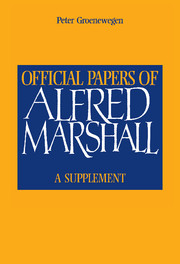Book contents
- Frontmatter
- Contents
- Preface and acknowledgements
- General introduction
- ITEM 1 Evidence to the Committee Appointed to Inquire into the Condition of Intermediate and Higher Education in Wales and Monmouthshire by Alfred Marshall, given at Newport, 20 December 1880
- ITEM 2 Gold and Silver Commission: note by Professor Marshall on Professor Nicholson's paper ‘On the Effects of a Fall in the Gold Price of Silver and General Gold Prices’ (dated 30 June 1888)
- ITEM 3 Material associated with Marshall's work for the Royal Commission on Labour 1891–1894
- ITEM 4 Appendix: Treasury document: ‘The Fiscal Problem’, 25 August 1903
- Index
ITEM 3 - Material associated with Marshall's work for the Royal Commission on Labour 1891–1894
Published online by Cambridge University Press: 04 August 2010
- Frontmatter
- Contents
- Preface and acknowledgements
- General introduction
- ITEM 1 Evidence to the Committee Appointed to Inquire into the Condition of Intermediate and Higher Education in Wales and Monmouthshire by Alfred Marshall, given at Newport, 20 December 1880
- ITEM 2 Gold and Silver Commission: note by Professor Marshall on Professor Nicholson's paper ‘On the Effects of a Fall in the Gold Price of Silver and General Gold Prices’ (dated 30 June 1888)
- ITEM 3 Material associated with Marshall's work for the Royal Commission on Labour 1891–1894
- ITEM 4 Appendix: Treasury document: ‘The Fiscal Problem’, 25 August 1903
- Index
Summary
On 27 March, Marshall received a letter from Arthur Balfour, the nephew of the then Conservative Prime Minister, Lord Salisbury, inviting him to join the Royal Commission on Labour. The setting up of the Commission had been announced by the Prime Minister during the previous February, because of a need to investigate a number of important issues in labour relations which had come into prominence during the late 1880s. Many of them arose from what is now described as the ‘new unionism’, that is, the replacement of the older, skilled craft unions with their generally conservative outlook on self-help and industrial disputation with the more militant, strike prone unskilled labour unions, of which the dockers were an outstanding example. The Commission's Final Report in 1894 concisely summarised the issues with which it was concerned in the following way:
(1) What are the leading causes of modern disputes between employers and employed; out of what conditions of industry do they arise; and what are the effects upon them of organisations on their side?
(2) By what means of institutions can they be prevented from arising, or if they do arise, can they be most pacifically settled without actual conflict in the shape of strikes or lock-outs?
(3) Can any of these causes of dispute be wholly or partially removed by practicable legislation, due regard being had to the general interests of the country?
- Type
- Chapter
- Information
- Official Papers of Alfred MarshallA Supplement, pp. 79 - 296Publisher: Cambridge University PressPrint publication year: 1996



